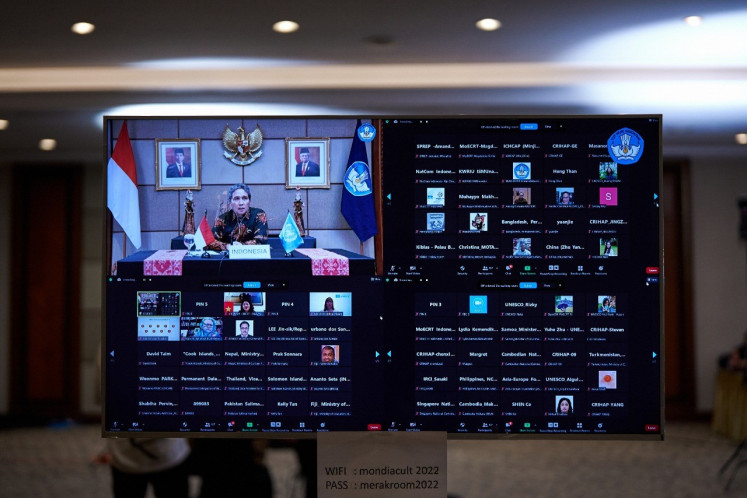Popular Reads
Top Results
Can't find what you're looking for?
View all search resultsPopular Reads
Top Results
Can't find what you're looking for?
View all search resultsIndonesia leads Asia Pacific Regional Consultation in run-up to UNESCO Mondiacult
Change text size
Gift Premium Articles
to Anyone
 Hilmar Farid, the Education, Culture, Research and Technology Ministry’s director general of culture, presides over the 2022 Mondiacult Asia-Pacific Online Regional Consultation, a discussion of issues and recommendations for international policy priorities in the field of culture in the Asia Pacific region, which was held on Tuesday and Wednesday
Hilmar Farid, the Education, Culture, Research and Technology Ministry’s director general of culture, presides over the 2022 Mondiacult Asia-Pacific Online Regional Consultation, a discussion of issues and recommendations for international policy priorities in the field of culture in the Asia Pacific region, which was held on Tuesday and Wednesday
T
he Education, Culture, Research and Technology Ministry’s Directorate General of Culture has taken a lead role in the Asia Pacific Online Regional Consultation meeting, mapping out a new global agenda pertaining to cultural policies for the region.
Held in the run-up to the UNESCO World Conference on Cultural Policies and Sustainable Development – Mondiacult 2022 that will take place from Sept. 28 to 30 in Mexico, the consultation is one of five regional online meetings that take place between December 2021 and February.
Indonesia leads the coordination process for the Asia Pacific region, one of the largest regions with the most diverse cultures in the world. Throughout the two-day session, ministers, government officials and representatives of international organizations met to identify major trends, pressing issues and areas of priority in regard to cultural policies in the region.
In the four decades since the first Mondiacult conference took place in 1982, the global order — including the cultural sector — has significantly changed. New problems have upended relations between nations, while global issues have pushed countries to adapt their policies to better carry out their roles in serving the global community.
At the same time, the COVID-19 pandemic has highlighted shared vulnerabilities between nations as they face emergency situations while also simultaneously upholding their own socioeconomic continuity. In the same context, the issues faced by the cultural sector showcase the dire need for adaptation in the sector.
UNESCO Assistant Director-General for Culture Ernesto Ottone said the world was entering the last decade of action for the implementation of the United Nations Sustainable Development Goals (SDG).
“UNESCO is engaging its member states and the international community to embark on a renewed reflection on cultural policies to tackle global challenges, such as inequality, conflicts, technological revolution and climate change,” he said.
Education, Culture, Research and Technology Minister Nadiem Makarim noted that the Asia Pacific region was home to a range of diverse cultures spread out across 48 countries in 17 different time zones.
“Through this regional collaboration, I am sure that we will be able to step into a sustainable future where, borrowing Ernesto Ottone’s phrase, humanity and its cultures will be placed at the core of development,” he said.








